megaloblast
(redirected from Megaloblasts)Also found in: Thesaurus, Medical, Encyclopedia.
meg·a·lo·blast
(mĕg′ə-lō-blăst′)n.
An abnormally large immature red blood cell (erythroblast) found especially in the blood of people with certain types of anemia and often associated with vitamin B12 deficiency.
meg′a·lo·blas′tic adj.
American Heritage® Dictionary of the English Language, Fifth Edition. Copyright © 2016 by Houghton Mifflin Harcourt Publishing Company. Published by Houghton Mifflin Harcourt Publishing Company. All rights reserved.
megaloblast
(ˈmɛɡələʊˌblɑːst)n
(Medicine) an abnormally large red blood cell precursor, present in certain types of anaemia
megaloblastic adj
Collins English Dictionary – Complete and Unabridged, 12th Edition 2014 © HarperCollins Publishers 1991, 1994, 1998, 2000, 2003, 2006, 2007, 2009, 2011, 2014
meg•a•lo•blast
(ˈmɛg ə ləˌblæst)n.
an abnormally large immature dysfunctional red blood cell found in the blood esp. of persons with pernicious anemia.
[1895–1900]
meg`a•lo•blas′tic, adj.
Random House Kernerman Webster's College Dictionary, © 2010 K Dictionaries Ltd. Copyright 2005, 1997, 1991 by Random House, Inc. All rights reserved.
ThesaurusAntonymsRelated WordsSynonymsLegend:
Switch to new thesaurus
| Noun | 1. |  megaloblast - abnormally large red blood cell present in pernicious anemia and folic acid deficiency megaloblast - abnormally large red blood cell present in pernicious anemia and folic acid deficiencyerythrocyte, RBC, red blood cell - a mature blood cell that contains hemoglobin to carry oxygen to the bodily tissues; a biconcave disc that has no nucleus |
Based on WordNet 3.0, Farlex clipart collection. © 2003-2012 Princeton University, Farlex Inc.